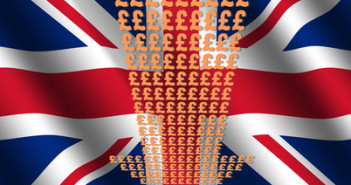More signs of an economic deterioration were seen in the UK during December. If there is no huge surprise, the initial GDP report for Q4, published at the end of January, will show that the economy contracted once again – the beginning of a third recession since the financial crisis began in 2008.
The British economy enjoyed an Olympic leap in Q3, growing an impressive 0.9% (originally reported +1%) and exiting the recession. This wasn’t sustained.
* This article is part of the January 2013 monthly forex report. You can download the full report by joining the newsletter in the form below.
Let’s start with some positive signs:
- The number of jobless claims actually dropped according to the latest report: the drop was small but still meaningful: 3K. It joined a smaller-than-expected drop beforehand. Also the unemployment rate ticked down from 7.9% to 7.8%. These could be green shoots.
- Manufacturing returned to growth: the Manufacturing PMI for December jumped from 49.2 to 51.4 points – back to growth after 7 months of scores under 50. While encouraging, the manufacturing sector is small.
There are more important notes on the downside:
- Services sliding: For the first time in 2 years, this sector is contracting: services are 75% of the British economy, so this is very worrying.
- Housing is going anywhere: recent HPIs are pointing to stability or slides, mortgage approvals disappointed and the construction PMI was below 50 points.
- Inflation isn’t falling: a level of 2.7% (annual) makes the task of the government and the BOE more complicated.
- Retail sales flat: For the month of November, sales remained unchanged. There is great concern about the holiday season: did Brits buy enough goods?
In addition, the austerity policy of the British government is not so effective in curbing Britain’s debt, as PSNB refuses to fall. On this background, the government is pressured to adopt a “Plan B”.
The Bank of England could expand the current QE program, but this seems ineffective: there are doubts about how much it helps the economy (apart from lowering borrowing costs for the government).
The immediate effect of QE (currently at 375 billion) on the pound is already minor: each announcement results in a temporary drop followed by a recovery.
However, in the longer run, the pound is certainly capped and fails to break higher against the greenback.
During January, we could see a weaker pound due to more signs of economic weakness, but these losses could be limited.
